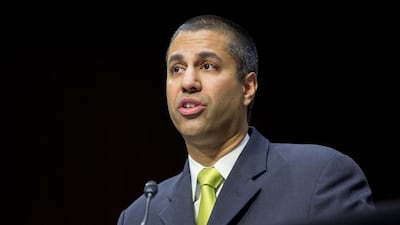In the week-plus since the US Federal Communications Commission announced its plan to kill net neutrality rules, a flood of commentators have warned that the internet as we know it may be coming to an end.
After the FCC votes to repeal the rules on December 14, access providers in the United States will have free rein to interfere with and manipulate the traffic that flows over their networks.
They’ll get to decide which websites and services get faster speeds, and charge their providers accordingly. Telecom companies may even be able to block services outright that compete with their own products.
This isn’t just a fictional dystopia; internet providers the world over have been engaging in such activities for many years. Killing the safeguards is thus a big problem for Americans in particular and the rest of the world in general.
With so many internet services based in the United States, the knock-on effects are likely to be global. If it gets more expensive for, say, Netflix or Google to do business on their home turf, those costs could be passed on to all users regardless of where they live.
It will also become tougher for new start-ups to grow or expand in the United States. Established players who can pay for prioritized access to users will have huge advantages.
The arguments for preserving US net neutrality rules, established under President Barack Obama in 2015, are therefore clear.
But what if axing them, as President Donald Trump’s appointed FCC chairman Ajit Pai aims to do, turns out to be the best thing to happen to the internet? It’s counter-intuitive, but it could well be.
_______________
Read more:
Nissan works the pedals of change with its new Leaf
Tesla should forget new vehicles and fix production woes instead
_______________
The underlying issue with traffic interference, after all, isn’t necessarily whether or not there are rules preventing telecom companies from doing it, but rather that consumers don’t have enough choices in how they can access the internet.
In a best-case scenario, the average household has a handful of options for internet access – usually a telecom company, a cable provider, and perhaps some smaller firms that resell services on a wholesale basis.
There’s also satellite and wireless provider, but neither delivers as much speed or capacity as basic wired service.
Americans have it particularly bad in that most have only a single choice when it comes to fast wired access, usually a cable company such as Comcast or Time Warner.
In theory, market forces should naturally ensure neutrality. If one internet provider blocks or slows down certain web services – say Netflix or YouTube – consumers could simply take their business to another company that doesn’t.
But, because there is little choice in the market, it’s easy for the few providers there are to act in unison. They can do as they like and consumers have no recourse.
Ordinarily, a market with monopoly-like conditions necessitates strong regulations to prevent such anti-competitive and anti-consumer behavior. But this is President Trump’s America, and these are not normal times.
Much of the commentary criticizing Mr Pai’s plan is working on the assumption that internet access in the United States, as well as in most developed countries – as dysfunctional as it is – has somehow reached its endpoint.
The reality is, it’s more likely early days – and this dysfunction can’t last forever. This abnormal FCC and its clear concern for corporate rather than consumer welfare may end up providing the spark that ends it.
For their part, it’s hard to imagine that internet and web companies at the heart of this struggle haven’t already run the scenarios and come up with contingencies.
Many have doubtlessly worked out estimates on the traffic prioritisation ransoms they’ll have to pay. They’re probably also running analyses on if and when it might become more cost-effective to build their own access networks.
Google has already done that work with its Fiber initiative, which offers high speed internet access in around 20 US cities. Other tech giants, such as Netflix or Amazon, may have similar thoughts. Some could conceivably even team up and share the cost of building alternative networks to circumvent telecom companies entirely.
They could also speed development of additional access methods. Google and Microsoft, for example, have been investigating the use of white spaces – unlicensed portions of the public airwaves – for data transmission. Some have even looked into delivering internet service via hot-air balloons and drones.
These different access types could go from half-baked curiosities to real options quickly if the feared shakedowns materialize.
As the saying goes, nature abhors a vacuum. If the FCC effectively kills the internet, it’s unlikely to stay dead. A new internet – with new ways of accessing it – will arise.
Laws preventing telecom company malfeasance are the best tools to maintaining the status quo, but the end of net neutrality could serve as a catalyst for something even better.
After all, the whole world would be better off without telecom companies and their tyranny of access.

